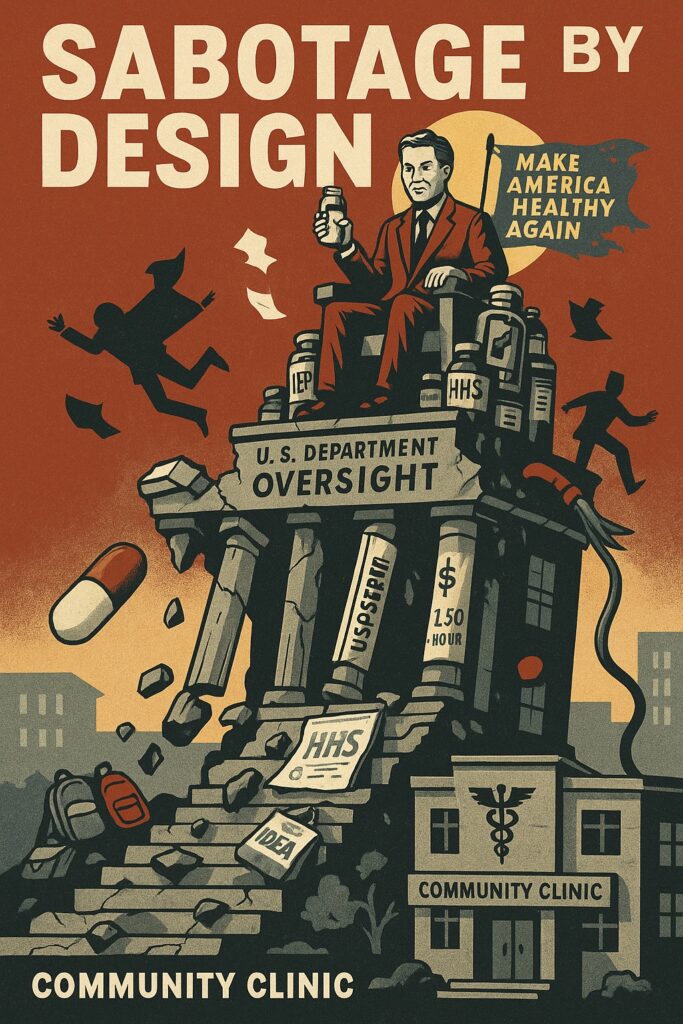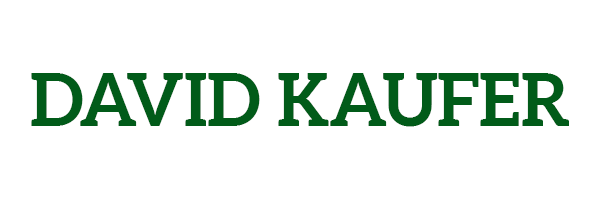The Darker Side of the Spectrum – Volume IV
“It doesn’t take sirens to signal collapse. Sometimes it sounds like silence, looks like paperwork, and hides behind procedure.”
This week’s dispatch begins with a revelation: the people claiming to dismantle “captured institutions” appear to be redirecting our trust—and our dollars—toward something just as compromised. From wellness profiteering to delayed grants, canceled medical panels, and the gutting of public education, these signals aren’t random. They’re systemic.
This is sabotage by design.
And those of us living at the margins—the disabled, non-speaking, neurodivergent, under-resourced, overburdened and underestimated—are being made to pay the price.

1. Wellness Over Watchdogs: How the “Health Freedom” Brand Pays Big
A new CNN/KFF investigation reveals that RFK Jr. and several top HHS advisors earned over $3.2 million from wellness-related ventures in just two years. While publicly attacking Big Pharma, they’ve quietly built financial ties to supplement companies, alternative clinics, and deregulated health services.
It’s not reform. It’s redirection—from one industry’s grip to another’s.
The global wellness market thrives in regulatory vacuums—and this administration is methodically creating those vacuums. Expert panels are being silenced. Oversight is being gutted. And those profiting are the ones charged with protecting public health.
This development underscores a profound conflict of interest. The Department of Health and Human Services is no longer merely a regulatory agency—it is now clearly a marketing arm for the unregulated wellness industry. Kennedy’s framing of “health freedom” may appeal to those disillusioned with pharmaceutical dominance, but in practice it erodes public trust and leaves the most vulnerable without protection or recourse.
Note: A full standalone post on this topic—The Wellness Hustle—is coming later this week. Stay tuned.
2. Dismantled by Design: The End of Federal Education as We Know It
The Supreme Court has greenlit mass layoffs and outsourcing within the U.S. Department of Education. Enforcement of IDEA is on track to be handed to HHS, and civil rights investigations may soon move to the DOJ.
This isn’t decentralization. It’s deliberate abandonment.
For disabled students, LGBTQ+ youth, and children of color, this means fewer protections, fewer investigations, and nowhere to turn when rights are violated. Laid-off DOE staff were handling thousands of open civil rights cases. With the department being gutted, those cases now risk being lost in transition—or buried altogether.
Secretary Linda McMahon has said the department’s “final mission” is to hand control over to the states. But the IDEA and other civil rights statutes exist because states routinely failed to protect vulnerable students. Outsourcing to agencies like HHS or DOJ may sound functional on paper, but these departments are neither designed nor staffed to enforce education-specific mandates. The result will be a collapse in oversight just as need surges.
3. Underpaid, Overlooked: When Disability and Wage Policy Collide
The Trump administration has reversed course on phasing out subminimum wages, preserving a program that allows disabled workers to be paid as little as $2.50/hour.
Meanwhile, the federal minimum wage has been stuck at $7.25 since 2009—the longest freeze in U.S. history. When adjusted for inflation, it’s now worth less than $5.50.
This is not a relic. It’s a system designed to exploit—and one that policymakers continue to protect.
Many disabled workers fall into the legal gap created by Section 14(c) of the Fair Labor Standards Act. Though originally intended to provide opportunity, the program has become a mechanism for segregation and exploitation. In 2024 alone, more than 40,000 disabled individuals were paid less than minimum wage, often in sheltered workshops with no clear path to competitive employment.
Advocates from across the political spectrum—including states like Tennessee and Illinois—have moved to phase out subminimum wage. But the federal decision to preserve it shows just how entrenched ableist labor policy remains. Disabled Americans are being treated not as workers deserving equal pay, but as a “special category” whose exploitation is framed as benevolence.
4. Preventive Care on Pause: Kennedy Cancels the Screeners
RFK Jr. canceled the July meeting of the U.S. Preventive Services Task Force, whose recommendations determine which preventive services must be covered by insurers.
He now has the authority to override their guidance or fire members entirely.
When evidence-based care becomes political theater, lives are lost—not to illness alone, but to interference, delay, and confusion.
The USPSTF has long operated as an independent panel of medical experts, issuing guidance that influences access to cancer screenings, HIV prevention, and cardiovascular care. By stalling its operations and gaining veto power, Kennedy can now filter which recommendations are allowed to proceed based not on science, but on ideological alignment.
This interference in medical guidance is unprecedented. If left unchecked, it will erode the foundation of evidence-based policy. Groups like AcademyHealth have already warned that trust in the Task Force is being decimated—a loss that could have cascading effects on public access to care.
5. The Bottleneck Bureau: DOGE Delays Critical Health Funding
The newly created and hypocritically named Department of Government Efficiency (DOGE) has slowed or blocked more than $1B in healthcare grants. Programs serving low-income patients, disabled individuals, and community clinics are facing payment delays and shortened application windows.
This isn’t fiscal prudence. It’s administrative sabotage.
Under DOGE’s “Defend the Spend” initiative, HHS must obtain clearance before releasing grant funds. This has introduced massive bottlenecks, with payment delays affecting everything from maternal health programs to staff salaries at community clinics. Some grants are now months behind schedule.
Officials are now proposing two-week application windows to catch up—a move that will inevitably favor large, well-resourced applicants and further marginalize grassroots providers. Meanwhile, patients and practitioners are left in limbo, as needed funds sit idle behind bureaucratic walls.
6. Candy-Coated Hypocrisy: Mars Rejects RFK’s Call to Ditch Dyes
Mars Inc. refused to remove synthetic dyes from Skittles and M&M’s—even though their European counterparts are already dye-free. The company invoked “consumer choice” and pointed fingers at alcohol and cigarettes.
You can’t claim to protect children’s health while defending petroleum-based dyes in their lunchboxes.
While RFK Jr.’s call for dye removal aligned with growing public health concern, Mars’ rejection reflects a broader theme: profit over precaution. Despite evidence linking certain dyes to behavioral challenges in children, Mars maintains its U.S. formulations, citing cost and consumer preference.
This signal showcases it clearly: even when the administration attempts to act protectively, it does so in a vacuum of credibility. Because when the overall field is one of deregulation, mixed motives, and institutional erosion, even reasonable measures look like political theater.
7. Shakeup at the Top: RFK Jr. Fires His Inner Circle
Just as Volume IV was preparing to close, the story cracked open once more: RFK Jr. abruptly fired both his chief of staff, Heather Flick, and his deputy chief of staff for policy, Hannah Anderson, following internal clashes and mismanaged personnel moves.
Even the architects of the MAHA machine couldn’t survive its instability.
According to CNN, Flick pushed to remove Anderson over dissatisfaction with her performance—but Kennedy fired Flick instead after the attempted ousting backfired and caught the White House off guard. The result? A leadership crisis at the top of HHS, just months into his tenure, with no permanent replacements named.
Both Flick and Anderson were key players in Kennedy’s agenda: Flick brought deep Trump-era HHS experience, while Anderson shaped much of the MAHA health policy narrative through her ties to the America First Policy Institute. Their removals signal internal chaos, fragile strategy, and a deepening fracture inside what was already a destabilizing administration.
What began as a war on oversight is now turning inward. And those who built the machine are being consumed by it.
🌍 Links & References
- CNN/KFF Report: https://www.cnn.com/2025/07/15/health/hhs-kennedy-pharma-wellness-kff-health-news
- AP Education Department Story: https://apnews.com/article/education-department-trump-scotus-linda-mcmahon-layoffs-04b582fc0d109e1840b22733fd985876
- Disability Scoop on Subminimum Wage: https://www.disabilityscoop.com/2025/07/12/feds-ditch-plan-to-end-subminimum-wage/30955/
- The Hill on USPSTF Cancellation: https://thehill.com/policy/healthcare/4740828-hhs-cancels-preventive-services-task-force-meeting-rfk-jr/
- KFF Health News on DOGE Delays: https://kffhealthnews.org/news/article/hhs-grant-funding-doge-delays-defend-the-spend/
- Benzinga on Mars & Dyes: https://www.benzinga.com/personal-finance/management/25/07/46381494/mm-skittles-maker-rejects-rfk-jr-s-call-to-drop-synthetic-dyes
- CNN on HHS Firings: https://www.cnn.com/2025/07/16/health/hhs-kennedy-shakeup-firings
